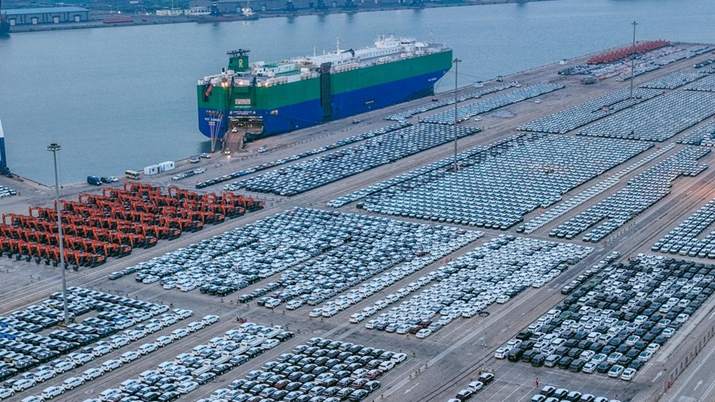| Business |
| China on track to become world's leading automobile exporter | |
|
|
 At the vehicle export terminal of Dalian Port, located in northeast China, brand-new cars were carefully loaded onto large cargo ships, ready to be shipped to Central Asia. Since the beginning of this year, the port has been in busy operation, providing logistics services for car exporters such as BMW Brilliance Automotive Ltd. (BBA), Volvo and FAW. According to Dalian Port, it shipped 36,750 vehicles from January to May, an increase of 116.15 percent from last year's same period. In Shanghai, the country's largest port city for automobile exports, vehicle exports are also picking up speed. According to Shanghai Customs, in the first five months of 2023, Shanghai's exports of electric passenger vehicles grew 152.9 percent year on year. Nationwide, China's vehicle exports soared to around 1.07 million units in the first quarter of 2023, data from the General Administration of Customs (GAC) showed, indicating that China has become the world's largest auto exporter in the period, outpacing Japan. From January to May, China shipped 1.93 million vehicles overseas, up 80 percent year on year, according to GAC. The China Passenger Car Association (CPCA) earlier forecast that China's vehicle exports will reach approximately 4 million units this year. "If this trend continues, it is very likely that China will surpass Japan to become the world's largest auto exporter in 2023," said Cui Dongshu, secretary general of the CPCA. Supportive measures At the Tiexi factory of BBA in the northeastern Chinese city of Shenyang, semi-trailers loaded with new cars can be seen rumbling out of the factory. "This batch of nearly 500 vehicles, all new energy vehicles (NEVs), enjoys a quick customs declaration procedure thanks to local preferential policies," said Chen Su, an employee of the foreign trade department of BBA, BMW's joint venture in China. Various customized car-shipping routes for ro-ro ships have also been launched to spur exports. Chinese auto giant SAIC Motor kicked off its maiden voyage in March with a new self-operated sea route connecting China's Ningde City with Mexico. Anji Phoenix, a ro-ro ship of SAIC with the largest capacity, set sail from Ningde Port, carrying the first batch of 1,000 MG models, to the port of Lazaro Cardenas in Mexico. The launch of this new cargo shipping route is an active move by SAIC Motor to expand its overseas business. Thanks to the new route, the carmaker is able to transport vehicles, which roll off the production line of its Ningde base, directly to Mexico, said Wang Zemin, general manager of SAIC Anji Logistics Co., Ltd. In 2022, SAIC's overseas market sales reached 1.017 million units. This is the first time that the annual overseas sales of a Chinese carmaker have crossed the 1-million mark. From January to May this year, SAIC sold 438,000 vehicles in overseas markets, up 47.7 percent year on year, continuing its strong upward momentum. In addition to domestic auto manufacturers, an increasing number of foreign carmakers have established their presence in China. Their presence is instrumental in promoting the high-quality development of China's automotive sector and fostering a strong surge in auto exports. Earlier this year, a batch of made-in-China Tesla electric vehicles was shipped from the Nangang wharf of the Shanghai Free Trade Zone to Thailand for the first time. According to Tesla China, its Shanghai Gigafactory delivered 710,000 vehicles in 2022, of which about 38 percent were exported overseas. Multiple markets NEVs are a highlight of China's vehicle exports. According to data from the China Association of Automobile Manufacturers, Chinese auto manufacturers exported 457,000 units of NEVs from January to May this year, an increase of 1.6 times over the same period last year. Since 2020, China's electric car manufacturers have begun to enter the overseas mainstream automobile markets and become more competitive relying on their original technologies and targeted market strategies. Targeting young consumers in Thailand, SAIC's NEV MG model is designed with an intelligent network interaction system that can understand Thai. Thai consumers can directly interact with the "i-Smart" intelligent network system on MG cars in Thai language, which makes MG cars especially popular among young consumers, said Supakij Visedpaitoon, public relations manager of MG Sales (Thailand) Co., Ltd. |
|
||||||||||||||||||||||||||||||
|